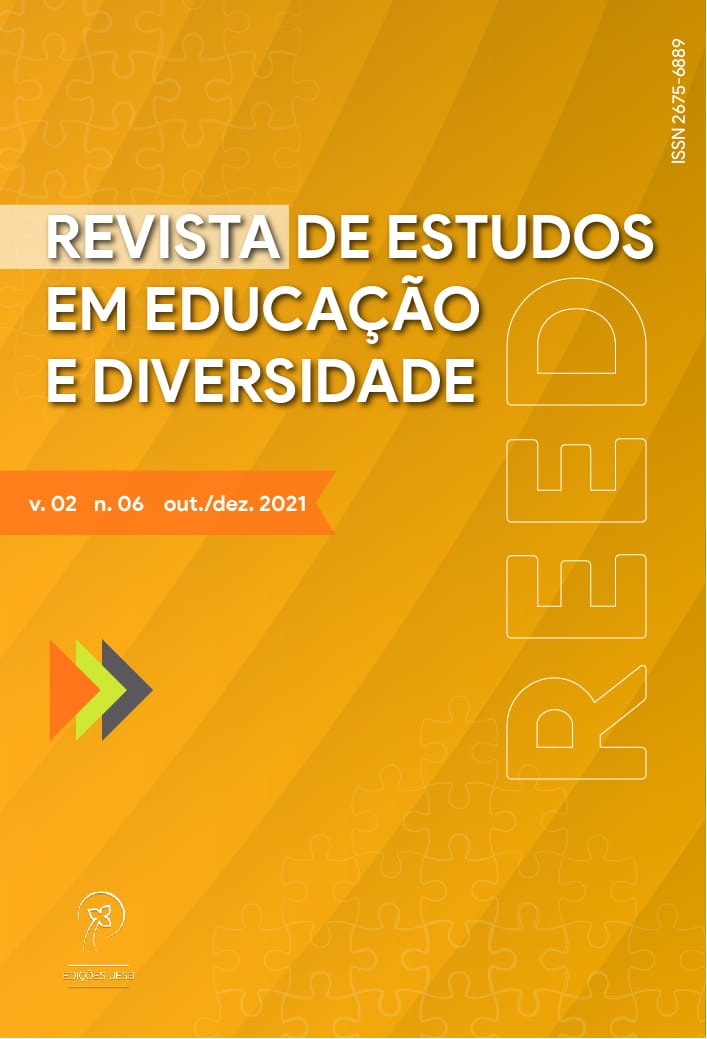A LIBERDADE NÃO TIRA FÉRIAS: BRINCAR LIVRE, LUDICIDADE E EDUCAÇÃO INFANTIL
DOI:
https://doi.org/10.22481/reed.v2i6.10109Palavras-chave:
Brincar livre, Ludicidade, Educação InfantilResumo
Este trabalho debate o brincar livre como um caminho didático a alicerçar a relação entre adultos de referência e crianças, a partir da concepção de uma criança potente e capaz de construir saberes de forma autônoma e independente. A pesquisa relatada tem cunho etnográfico (ANDRÉ, 1995) e os dados para análise foram coletados através de observações, filmagem e diário de campo até a produção de uma análise microgenética realizada dentro do espaço físico escolar. Busca-se desmistificar a polaridade entre atividade lúdica e sistemática fazendo-nos olhar para os processos de integração das culturas lúdica, infantil e educativa. Do mesmo modo, pressupõe-se que os elementos que distinguem as atividades lúdicas das sistematizadas podem ser revelados através do grau de iniciativa e protagonismo das crianças ao realizá-las. Entende-se que o brincar parece mais livre que uma atividade sistemática, por possuir polissemia aberta. Curiosamente, a análise de algumas situações gravadas mostrou-nos que, quando é resguardada à criança a liberdade de escolher o processo de realização dessas atividades, a atividade sistemática também oferece abertura polissêmica tanto quanto as atividades lúdicas.
Downloads
Referências
ARIÈS. P. História social da criança e da família. 2 ed., Rio de Janeiro: Hahar Editores, 1981.
ANDRÉ, M. E. D. A. Etnografia da prática escolar. Papirus: Campinas, 1995.
BAKHTIN, M. Marxismo e filosofia da linguagem: problemas fundamentais do método sociológico na ciência da linguagem. São Paulo: Annablume, 2002.
BROUGÈRE, G. Jogo e educação. Porto Alegre: Artes Médicas, 2003.
CLOT, Y. L`autoconfrontation croisée em analyse du travail: l´ápport de la théorie bakhtinienne du dialogue. Equipe de Clinique de l'activité du CNAM. 2005.
COSTA, M. F. V. Discurso, jogo simbólico e escola: uma leitura dialógica do lúdico. 2001. Tese (Doutorado em Educação) – Universidade Federal do Ceará, 2001.
COSTA, M. F. V.; RIBEIRO, R. B. Bonecas: objeto de conflito identitário na arena da dominação cultural. In: _____; _____. (Orgs.) Diversidade cultural e desigualdade: dinâmicas identitárias em jogo. Fortaleza: Editora UFC, 2004. (Diálogos Intempestivos, 17).
CRUZ, L. B. S.; SILVA, M. A. A.; SILVA; M. G. A. A. A Ludicidade se faz presente: caminhos teórico-práticos que conduzem o fazer da ação humana. In: ANDRADE, D. M. M.; ABREU, R. (Org.) Formação de professores e ludicidade: sobre sonhos possíveis. Curitiba: CRV, 2019. p. 117-134.
FERRAZ, R. C. S. N.; FERREIRA. L. G. O ato de ensinar como estado de ludicidade. In: ANDRADE, D. M. M.; ABREU, R. (Org.). Formação de professores e ludicidade: sobre sonhos possíveis. Curitiba: CRV, 2019. p. 77-86.
FERREIRA, L. G. Os Ateliês Biográficos de Projeto e os processos formativos de professores: diálogos, (auto) biografia e ludicidade. APRENDER - Caderno de Filosofia e Psicologia da Educação, Vitória da Conquista Ano IX n. 15 p.99-110 2015. Disponível em: https://periodicos2.uesb.br/index.php/aprender/article/view/2458. Acesso em: 13 out. 2016.
FERREIRA, Lúcia Gracia. Formação de professores e ludicidade: reflexões contemporâneas num contexto de mudanças. Revista De Estudos em Educação e Diversidade, v. 1, n. 2, 410-431. 2020. Disponível em: https://periodicos2.uesb.br/index.php/reed/article/view/7901. Acesso em: 13 jan. 2021.
FOUCAULT, M. A ordem do discurso. São Paulo: Loyola, 1970.
FREIRE, P. Pedagogia da Tolerância. São Paulo: Paz e Terra: 2004.
GEERTZ, C. A interpretação das culturas. Rio de Janeiro: LTC, 1989.
GÓES, M. C. R. “A abordagem microgenética na matriz histórico-cultural: Uma perspectiva para o estudo da constituição da subjetividade”. Cadernos Cedes, ano XX, no 50, p. 9-25, 2000.
PINTO, G. A. de T. Sentidos do lúdico na educação infantil: dos dispositivos institucionais aos modos de fazer. 2009. Tese (Doutorado em Educação) – Universidade Federal do Ceará, Faculdade de Educação, Programa de Pós-graduação em Educação Brasileira, Fortaleza, 2009.
TRAVAGLIA, L. C. Gramática e interação: uma proposta para o ensino de gramática no 1º e 2º grau. São Paulo: Cortez, 1997.
VYGOTSKY, L. S. A formação social da mente: o desenvolvimento dos processos psicológicos superiores. São Paulo: Martins Fontes. 1994.
VYGOTSKY, L. S. A construção do pensamento e da linguagem. São Paulo. Martins Fontes, 2000.
WAJSKOP, G. Brincar na pré-escola. São Paulo: Cortez, 2001.
WALLON, H. A evolução psicológica da criança. Portugal: Edições 70, 1968.
Downloads
Publicado
Como Citar
Edição
Seção
Licença
Copyright (c) 2021 Revista de Estudos em Educação e Diversidade - REED

Este trabalho está licenciado sob uma licença Creative Commons Attribution 4.0 International License.
Você é livre para:
Compartilhar - copia e redistribui o material em qualquer meio ou formato; Adapte - remixe, transforme e construa a partir do material para qualquer propósito, mesmo comercialmente. Esta licença é aceitável para Obras Culturais Livres. O licenciante não pode revogar essas liberdades, desde que você siga os termos da licença.
Sob os seguintes termos:
Atribuição - você deve dar o crédito apropriado, fornecer um link para a licença e indicar se alguma alteração foi feita. Você pode fazer isso de qualquer maneira razoável, mas não de uma forma que sugira que você ou seu uso seja aprovado pelo licenciante.
Não há restrições adicionais - Você não pode aplicar termos legais ou medidas tecnológicas que restrinjam legalmente outros para fazer qualquer uso permitido pela licença.






